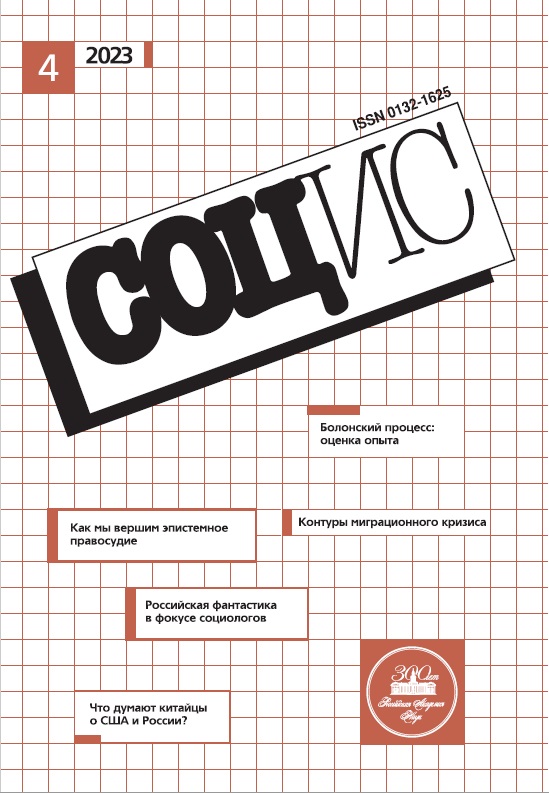Russian Sociology in the Context of Society Digitalization: Results of a Corpus Analysis of Scientific Texts
- Authors: Smirnov A.V.1
-
Affiliations:
- Institute for Socio-Economic and Energy Problems of the North, Komi Science Centre, Ural Branch of the RАS
- Issue: No 4 (2023)
- Pages: 39-50
- Section: Articles
- URL: https://cijournal.ru/0132-1625/article/view/661608
- DOI: https://doi.org/10.31857/S013216250022128-3
- ID: 661608
Cite item
Abstract
Using the analysis of a corpus of texts from eight leading Russian sociological journals, the article examines the impact of the digitalization of society on sociology in 2000-2021. Frequency analysis of 13.8 thousand scientific texts tracked the introduction of concepts related to digitalization into scientific circulation. The article reveals the differences between the journals, due to their editorial policy in the selection of articles. Through content analysis of texts, the author studied the experience of using digital social platforms as a source of data and an object of reflection. The text shows that they are being used more and more over time, and since 2019, one in five publications mentions digital platforms. The study confirmed that due to the introduction of new digital technologies, the frequency and complexity of the software tools used by sociologists is increasing. Since 2015, there has been an increase in the number of studies whose authors develop their own algorithms for data collection and analysis. The identified trends are likely to continue in the future, as all the indicators considered show a steady increase over time. In the conclusions of the article, the author formulates the prospects for studying the patterns of development of sociological science using the methods of corpus linguistics.
About the authors
Andrey Vladimirovich Smirnov
Institute for Socio-Economic and Energy Problems of the North, Komi Science Centre, Ural Branch of the RАSSyktyvkar, Russia
References
- Богданов М.Б., Смирнов И.Б. Возможности и ограничения цифровых следов и методов машинного обучения в социологии // Мониторинг общественного мнения: экономические и социальные перемены. 2021. № 1. С. 304–328. doi: 10.14515/monitoring.2021.1.1760.
- Булычева Е.Е., Мальцева Д.В. Выделение актуальных тематик в социологии: взгляд сквозь призму анализа сети цитирований // Мониторинг общественного мнения: экономические и социальные перемены. 2020. № 6. С. 113–140. doi: 10.14515/monitoring.2020.6.971.
- Бызов А.А. Интеллектуальный анализ текстов в социальных науках // Социология: методология, методы, математическое моделирование. 2019. № 49. С. 131–160.
- Губа К.С. Быть главным журналом в российской социологии: когда миссия имеет значение // Экономическая социология. 2019. Т. 20. №. 4. С. 14–38. doi: 10.17323/1726-3247-2019-4-14-38.
- Дудина В.И. «Пересборка социологии»: цифровой поворот и поиски новой теоретической оптики // Социологические исследования. 2021. № 11. С. 3–11. doi: 10.31857/S013216250016829-4.
- Дудина В.И. Цифровые данные – потенциал развития социологического знания // Социологические исследования. 2016. № 9. С. 21–30.
- Дудина В.И., Юдина Д.И. Извлекая мнения из сети Интернет: могут ли методы анализа текстов заменить опросы общественного мнения? // Мониторинг общественного мнения: Экономические и социальные перемены. 2017. № 5. С. 63–78. doi: 10.14515/monitoring.2017.5.05.
- Журавлёва Е.Ю. Эпистемический статус цифровых данных в современных научных исследованиях // Вопросы философии. 2012. № 2. С. 113–123.
- Кинчарова А.В., Соколов М.М. Исследовательские практики российских социологов // Социологические исследования. 2015. № 6. С. 58–68
- Колозариди П.В., Макушева М.О. Интернет как проблемное поле социальных наук // Мониторинг общественного мнения: Экономические и социальные перемены. 2018. № 1. С. 1–11. doi: 10.14515/monitoring.2018.1.01.
- Смирнов А.В. Цифровое общество: теоретическая модель и российская действительность // Мониторинг общественного мнения: экономические и социальные перемены. 2021. № 1. С. 129-153. doi: 10.14515/monitoring.2021.1.1790.
- Смирнов В.А. Новые компетенции социолога в эпоху больших данных // Мониторинг общественного мнения: экономические и социальные перемены. 2015. № 2. С. 44–54. doi: 10.14515/monitoring.2015.2.04.
- Соколов М.М. Академические репутации в российской социологии: опыт измерения // Социологические исследования. 2021. № 3. С. 44–56. doi: 10.31857/S013216250013728-3.
- Срничек Н. Капитализм платформ. 2-е изд. М.: ВШЭ, 2020.
- Татарова Г.Г., Кученкова А.В. «Методная» проблематика на страницах журнала «Социологические исследования» (2000–2018) // Социологические исследования. 2020. № 7. С. 47–56. doi: 10.31857/S013216250009486-7.
- Толстова Ю.Н. Социология и компьютерные технологии // Социологические исследования. 2015. № 8. С. 3–13.
- Billari F., Zagheni E. Big Data and population processes: A revolution? // SIS 2017. Statistics and data science: new challenges, new generations. Florence: Firenze University Press, 2017. P. 167–178. doi: 10.36253/978-88-6453-521-0.
- Boullier D. Big data challenges for the social sciences: from society and opinion to replications // ISA eSymposium for Sociology. 2017. Vol. 7 (2). URL: https://www.boullier.bzh/wp-content/uploads/EBul-Boullier-Jul2017.pdf (дата обращения: 01.06.2022).
- Brayne S. Big data surveillance: The case of policing // American Sociological Review. 2017. Vol. 82 (5). P. 977–1008. doi: 10.1177/0003122417725865.
- Christin A. Counting Clicks: Quantification and Variation in Web Journalism in the United States and France // American Journal of Sociology. 2018. Vol. 123 (5). P. 1382–1415. doi: 10.1086/696137.
- Dimaggio P., Hargittai E. From the ‘digital divide’ to ‘digital inequality’: Studying Internet use as penetration increases. Working Paper #15. Princeton University: Center for Arts and Cultural Policy Studies, 2001.
- Golder S.A., Macy M.W. Digital footprints: opportunities and challenges for online social research // Annual Review of Sociology. 2014. Vol. 40 (1). P. 129–152. doi: 10.1146/annurev-soc-071913-043145.
- Ignatow G. Theoretical foundations for digital text analysis // Journal for the Theory of Social Behaviour. 2015. Vol. 46 (1). P. 104–120. doi: 10.1111/jtsb.12086.
- Katzenbach C., Bächle T.C. Defining concepts of the digital society // Internet Policy Review. 2019. Vol. 8 (4). doi: 10.14763/2019.4.1430.
- Kitchin R. Big data, new epistemologies and paradigm shifts // Big Data & Society. 2014. Vol. 1 (1). P. 1–12. doi: 10.1177/2053951714528481.
- Korobov M. Morphological analyzer and generator for Russian and Ukrainian languages // International Conference on Analysis of Images, Social Networks and Texts. Cham: Springer, 2015. P. 320–332.
- Lazer D., Radford J. Data ex machina: Introduction to big data // Annual Review of Sociology. 2017. Vol. 43 (1). P. 19–39. doi: 10.1146/annurev-soc-060116-053457.
- Lupton D. Digital sociology. London, New York: Routledge, 2015.
- Zinn J.O. The UK at risk. A corpus approach to social change 1785–2009. Cham: Palgrave Macmillan, 2020. doi: 10.1007/978-3-030-20238-5.
Supplementary files










